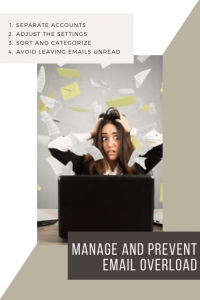By Communication Consultant Duy Nguyen (Accounting and BIS, ’22)
 We have all become more accustomed to the new norms of remote working and meetings, but challenges remain in the realm of virtual communication. Information overload is one such challenge faced by both professionals and students, particularly when it comes to email. Considering the significant amount of emails we receive, we can benefit from a method to filter and organize incoming email messages.
We have all become more accustomed to the new norms of remote working and meetings, but challenges remain in the realm of virtual communication. Information overload is one such challenge faced by both professionals and students, particularly when it comes to email. Considering the significant amount of emails we receive, we can benefit from a method to filter and organize incoming email messages.
First, consider using separate accounts for personal and work emails. Consolidating work-related messages in one place makes it easier to find and eliminate distraction from personal correspondence.
Next, be sure to adjust the settings on the spam or junk mail filters so that most unwanted messages will not appear in the inbox folder. In the event that nonessential or spam emails manage to get through, remove them immediately to maintain a consistent and “clean” inbox.
Sorting and categorizing allows us to prioritize. For important emails that we might need to retrieve for later use, the “star” or flagging function makes fetching such messages prompt and hassle free. Also, consider creating folders or using labels to organize emails related to specific projects or classes so that they can easily be found.
Another helpful practice is to avoid leaving emails unread even if you aren’t ready to act on them right away. Leaving emails unread puts us at risk of missing out on crucial or time-sensitive issues. Additionally, your inbox would become rather cluttered, making important emails more difficult to find. Instead, consider opening all emails and setting up reminders to get back to some tasks later.
Now that our emails have been sorted, there are a few additional ways to prevent email information overload. First, schedule your email time rather than sitting with your email account open. One strategy is to read and act on emails once in the morning, once before lunch, and once in the late afternoon. After gathering the to-do tasks from emails, arrange those tasks based on their priority in order to approach them in an efficient manner. Finally, consider a time “curfew” for sending and receiving emails; placing a time limit on daily information intake goes a long way toward reducing the possibility of overload.
Get information and resources about our center at The Philip Rauch Center for Business Communication.
